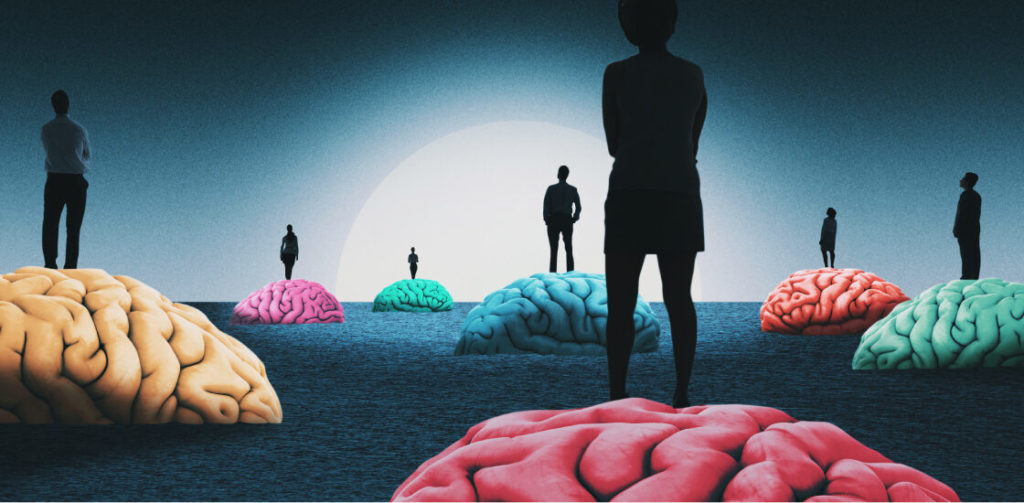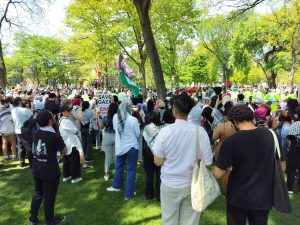This April is the sixth Autism Acceptance Month I’ve experienced since I first learned of my Autism Spectrum Disorder (ASD) diagnosis in 2016, halfway through my freshman year of college. However, it’s the first Autism Acceptance Month where I’ve felt comfortable fully owning my disability and the many ways it has shaped who I am and how I navigate the world.
There are many reasons why I’m only now starting to accept myself as autistic. On a personal level, freshman Sam Carliner had a lot of internalized ableism due to the social isolation inherent in capitalism. When you have a disability that makes it more difficult to understand the unspoken rules of social interaction, as is the case with ASD, it’s easy to be especially impacted by the burden capitalism places on those who don’t “fit in.”
Still, while the six-year-long process of unlearning my negative assumptions about autism and then coming to appreciate it is a major reason it took so long for the concept of Autism Acceptance Month to resonate with me, there’s another reason I feel particularly connected to my disability this April.
In May of last year, I graduated from college, making this past year the first time since kindergarten that I haven’t been a student. This means that for the first time in my life, I’ve thought of myself not primarily as a student, but as a worker under capitalism. As a result, all the ways my disability is incompatible with this system have been at the forefront of my mind.
Of course, this isn’t the first time I’ve had to think about how capitalism makes it more difficult for autistic folks to live their lives. Even before I learned my diagnosis, I knew that I experienced the world differently than those who aren’t on the spectrum, and it was clear this would present unique challenges throughout my life. Still, as a student, I focused mostly on overcoming my challenges within social situations and put more practical, “adult life” concerns on the back-burner. It’s important to note that I was only able to focus on developing my interpersonal skills because my parents gave me financial and emotional support that many people on the spectrum aren’t able to rely on.
Autism is a spectrum, so the way I experience the world and its challenges can be vastly different from the experiences of other autistic folks. Even what I alone am capable of can vary from day to day or hour to hour. However, one consistency throughout my life and for the vast majority of, if not all, people with disabilities is that it is difficult to work regularly under capitalism.
For one thing, it’s especially difficult for me to take in multiple sensory sensations all at once, so I’m prone to getting overstimulated when I’m in a car and my surroundings are passing by faster than my brain can take them in. This means I can’t drive, and as a result, the jobs I’m able to work are significantly limited by where the United States’ horribly under-funded public transportation can take me. This risk of overstimulation also makes me incapable of working fast-paced jobs such as retail or food service, ruling out the vast majority of jobs that tend to have regular openings.
Even virtual jobs can be difficult if there is no clear structure of communication and routine to the tasks expected of me. In the past, this has meant that freelance writing companies that might hire me initially will find me to be less effective or reliable than other freelancers, and as a result, give me less assignments.
While I can only speak about my personal experiences of trying to find work that my autistic brain can navigate comfortably, I know for certain that I’m not alone. A 2013 study by the University of Massachusetts found that adults with intellectual disabilities are more than twice as likely to be unemployed as adults without these disabilities.
This is not a problem with autistic and other disabled folks’ ability to work. Since graduating, I have worked constantly in the area I studied in college, journalism. I consume news and news analysis from sunup to sundown every weekday, produce a weekly news podcast, contribute regularly to Left Voice as a writer and organizer, attend monthly protests, and even took a two-week trip to Alabama with other comrades to report on the Amazon unionization effort in Bessemer. I’m sure countless other autistic folks can cite their capacity to work hard, even if they don’t make any money for the work that they do.
The problem is that we don’t live in a system where work exists because it is personally fulfilling or useful to the public good. We live in a system that uses work for the sole purpose of creating as much profit as possible for the capitalist class which owns the means of production. For this reason, autistic folks and all other workers with disabilities are seen as less desirable and have less opportunities to work in environments that meet our unique neurological or physical needs. While we can easily do great things when our needs are being met and we have access to a work field we understand, we cannot count on having that type of work while also being able to afford the great costs capitalism places on everything we need to stay alive, and we cannot easily adapt ourselves to jobs that might allow us to provide for ourselves financially.
The late disability rights activist and Marxist, Marta Russell1Marta Russell, “The New Reserve Army of Labor?” Review of Radical Political Economics 33, no. 2 (Spring 2001): 223-34, summarized the problem best:
To business, the hiring or retaining of an employee with a disability represents nonstandard extra costs when calculated against a company’s bottom line. Whether real or perceived in any given instance, employers anticipate increased costs in the form of providing reasonable accommodations, speculate that disabled workers will increase their workers’ compensation costs, and project extra administration costs to hire an unknown quantity, the nonstandard worker.
This analysis of why disabled workers are less desirable within capitalism is not fully representative of my experiences. I have what’s known as an invisible disability, meaning that if I choose to — and I often do for personal reasons — I can pass myself off as someone who doesn’t have a disability. However, while Russell’s explanation of the problem may not apply as much to me as to someone who cannot hide their disability, it is true that every challenge I’ve faced due to my autism is due to the fact that capitalism creates environments that people are expected to adapt themselves to, rather than accommodating people’s needs or comforts, whatever they may be.
You might be interested in: Inaccessible Polls: Disabled People Also Struggle with Voter Suppression
In preparation for this article, I went back and read another article about autism and capitalism written by a Left Voice comrade who’s also on the spectrum. He ends the article by quoting the popular Marxist principle, “From each according to his ability, to each according to his needs.”
This line is used often by plenty of Marxists, autistic or not. But it’s noteworthy that another autistic writer at Left Voice felt it was important to tie the principle to his own experiences with being autistic under capitalism. Speaking for myself, this principle means the world to me, having grown up under a system that doesn’t see my abilities as valuable, or my needs as important. The fact is that capitalism, by its very design, creates unnecessary challenges for people who, either for physical or neurological reasons, aren’t as capable of working as efficiently as others. People with disabilities will always live more difficult lives as long as the world keeps being run to create profit for private interests instead of to meet the needs of all people.
Abolishing capitalism won’t automatically eliminate ableism, but it will certainly make it easier people of all disabilities to live and fight for equality. As long as the profit motive of capitalism rules all social relations, basic accommodations for disabilities will remain an inconvenient added cost to those in power. That is why this Autism Acceptance Month, and every Autism Acceptance Month moving forward, I’ll be clear that the fight for autism acceptance is the fight for socialism.
Notes
| ↑1 | Marta Russell, “The New Reserve Army of Labor?” Review of Radical Political Economics 33, no. 2 (Spring 2001): 223-34 |
|---|











